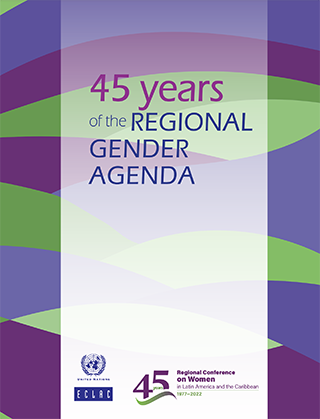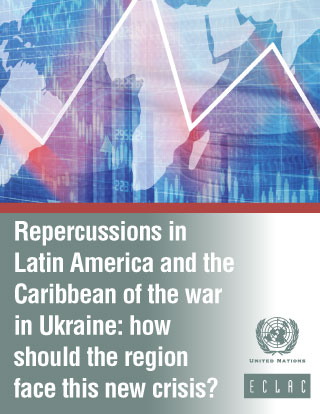- Biblioteca CEPAL
- Biblioguias
- biblioguias_en
- 75 years of ECLAC and ECLAC thinking
- The 2020s: transformation of the development model into a more productive, inclusive and sustainable one
75 years of ECLAC and ECLAC thinking
The 2020s: transformation of the development model into a more productive, inclusive and sustainable one

Swearing-in ceremony for José Manuel Salazar Xirinachs, Executive Secretary of ECLAC
Secretary-General António Guterres (right) swears in José Manuel Salazar-Xirinachs, Executive Secretary of the Economic Commission for Latin America and the Caribbean (ECLAC).
United Nations, New York, August 12, 2022.
Credit: UN Photo/Manuel Elías.

ECLAC Staff on the UN International Day for the Elimination of Violence Against Women
ECLAC staff gathered in front of the ECLAC building to commemorate the International Day for the Elimination of Violence Against Women. Santiago, Chile, November 25, 2022.
Credit: ECLAC, United Nations.

Mario Lubetkin, FAO Regional Representative for Latin-America and the Caribbean with José Manuel Salazar-Xirinachs, Executive Secretary of ECLAC
Santiago of Chile, December 15, 2022
Credit: ECLAC, United Nations

Representatives of the participating countries at the inauguration of the XV Regional Conference on Women in Latin America and the Caribbean
Buenos Aires, Argentina, November 7-11, 2022.
Credit: ECLAC, United Nations

José Manuel Salazar-Xirinachs, ECLAC Executive Secretary presents the challenges of comprehensive development in the region
Thirty-ninth session of ECLAC. Buenos Aires, Argentina, October 24, 2022,
Credit: ECLAC, United Nations

Young leaders from Latin America and the Caribbean close the Concausa 2022 initiative with an emphasis on mental health
Adolescents from 12 countries and experts at the closing of the sixth session of the Concausa initiative, a regional program that seeks to make visible and strengthen proposals led by young people of the continent so that they can have an impact on their realities and move towards sustainable and inclusive development. It was organized by América Solidaria, UNICEF and ECLAC. Santiago, Chile, November 30, 2022.
Credit: ECLAC, United Nations.

UN Deputy Secretary-General Amina Mohammed (right) meets with José Manuel Salazar-Xirinachs, Executive Secretary of ECLAC
New York, September 12, 2022.
Credit: UN Photo/Eskinder Debebe

Recognition to Alicia Bárcena Ibarra, Executive Secretary of ECLAC for her career in the organization
Forum of the Countries of Latin America and the Caribbean on Sustainable Development 2022.
Costa Rica, March 7-9, 2022.
Credit: ECLAC, United Nations.

Alicia Bárcena Ibarra, ECLAC Executive Secretary in the inauguration of the Thirty-eighth session of ECLAC
Virtual meeting, October 26-28, 2020.
Credit: ECLAC, United Nations.

10 priority policy areas for transforming the region’s development model proposed by ECLAC (2022)
ECLAC, 2022
Credit: ECLAC

The outbreak of the COVID-19 pandemic exposed the fragilities and vulnerabilities of our world. The Latin American and Caribbean region has been the hardest hit, in terms of infection and death rates, but also in terms of the extent to which economic and social conditions have worsened.
With only 10 years to go to the deadline for the 2030 Agenda for Sustainable Development, the structural challenges that must be overcome to implement the Agenda have increased, with multiple crises even before the war in Ukraine, a conflict that has added an inflationary shock, a food security crisis and rises in interest rates that have driven up debt service and narrowed fiscal space.
Despite signs of progress in some areas, the cascading crises have had spillover effects on food and nutrition, health, education, the environment, fiscal space, peace and security.
Nevertheless, the countries have maintained their commitment and efforts to fulfil the 2030 Agenda. The countries of the region have taken ownership of the SDGs as a State commitment, in wide-ranging cooperation with multiple stakeholders, including civil society, youth, the private sector, academia, and local, legislative and parliamentary authorities.
Since the launch of the 2030 Agenda, 31 of the 33 countries in Latin America and the Caribbean have reported on their progress on ownership, monitoring and implementation of the 2030 Agenda by presenting at least one voluntary national review to the United Nations high-level political forum on sustainable development in New York.
The 2020s are the decade of action and delivery for sustainable development, in order to achieve the SDGs by 2030. In addition, as set out in the report of the Secretary-General of the United Nations entitled “Our Common Agenda”, the decade has begun with a push for more effective multilateralism and more integrated, inclusive and coherent coordination.
Following these precepts, upon arrival of Executive Secretary José Manuel Salazar-Xirinachs from Costa Rica in October 2022, ECLAC championed actions in 10 priority areas to transform the development model in the countries of the region:
- Promoting productivity, productive development, employment and inclusive growth
- Reducing inequality
- Universalizing social protection and improving the welfare state
- Improving education and vocational training
- Promoting gender equality and the care society
- Promoting sustainability, climate change mitigation and adaptation
- Digital transformation
- Suitable migration management
- Promoting regional and global economic integration
- Macroeconomics for development
In addition, as a cross-cutting theme, the Executive Secretary has proposed placing greater emphasis on the issues of governance, management, coordination, planning, institutional quality and social dialogue and participation as a fundamental challenge relating to how the development model can be transformed.
Selected Text
“… ECLAC advocates for Latin America and the Caribbean to redouble its efforts to both reactivate its economies as well as to transform countries’ development models, centering these efforts around policies for productive transformation and diversification along with a big, public and private investment push, which would allow for accelerating structural change and technological and digital transformation to achieve high, sustained growth and sustainable and inclusive development … This is an ambitious agenda, but the reality is that this is not a time for gradual or tepid changes – ambitious and transformational changes are needed. Only by boosting the level of ambition can we respond to this quantity of simultaneous challenges and shocks, and to the complexity of our region’s economies and societies …” (José Manuel Salazar-Xirinachs, Towards Transformation of the Development Model in Latin America and the Caribbean [Press Release of Executive Secretary of ECLAC - October 31, 2022).
Position Papers of the Sessions of the Commission
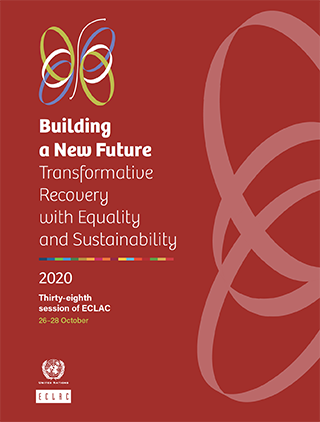
Building a New Future: Transformative Recovery with Equality and Sustainability
LC/SES.38/3-P/Rev.1
Publication date: October 2020

Towards transformation of the development model in Latin America and the Caribbean: production, inclusion and sustainability
LC/SES.39/3-P
Publication date: October 2021
Featured Publications
-
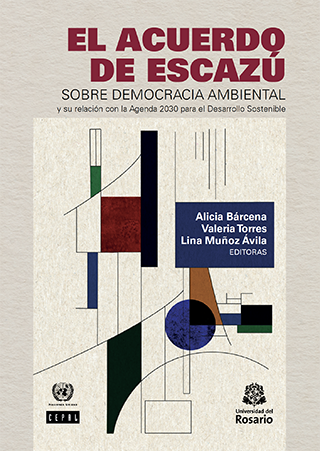 El Acuerdo de Escazú sobre democracia ambiental y su relación con la Agenda 2030 para el Desarrollo Sostenible
by
Call Number: LC/TS.2021/96Publication Date: 2021-11
El Acuerdo de Escazú sobre democracia ambiental y su relación con la Agenda 2030 para el Desarrollo Sostenible
by
Call Number: LC/TS.2021/96Publication Date: 2021-11 -
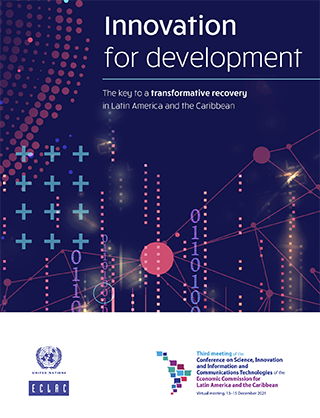 Innovation for development: The key to a transformative recovery in Latin America and the Caribbean
by
Call Number: LC/CCITIC.3/3Publication Date: 2021-12
Innovation for development: The key to a transformative recovery in Latin America and the Caribbean
by
Call Number: LC/CCITIC.3/3Publication Date: 2021-12 -
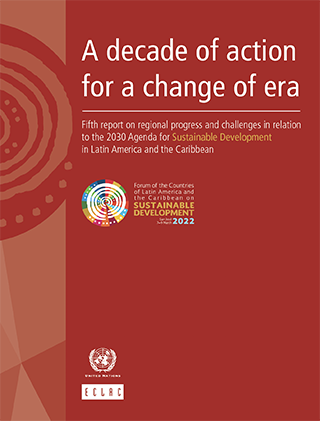 A decade of action for a change of era. Fifth report on regional progress and challenges in relation to the 2030 Agenda for Sustainable Development in Latin America and the Caribbean
by
Call Number: LC/FDS.5/3Publication Date: 2022-03
A decade of action for a change of era. Fifth report on regional progress and challenges in relation to the 2030 Agenda for Sustainable Development in Latin America and the Caribbean
by
Call Number: LC/FDS.5/3Publication Date: 2022-03 -
-
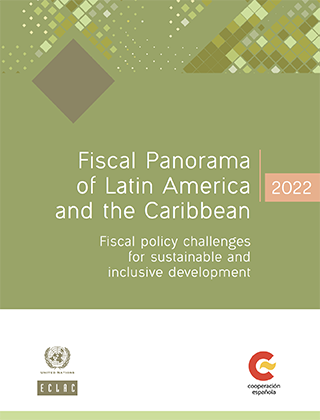 Fiscal Panorama of Latin America and the Caribbean 2022: Fiscal policy challenges for sustainable and inclusive development
by
Call Number: LC/PUB.2022/7-PPublication Date: 2022-06
Fiscal Panorama of Latin America and the Caribbean 2022: Fiscal policy challenges for sustainable and inclusive development
by
Call Number: LC/PUB.2022/7-PPublication Date: 2022-06 -
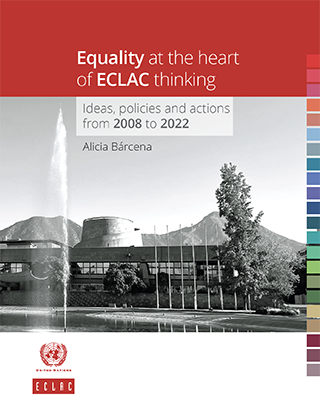 Equality at the heart of ECLAC thinking: Ideas, policies and actions from 2008 to 2022
by
Call Number: LC/PUB.2022/6Publication Date: 2022-07
Equality at the heart of ECLAC thinking: Ideas, policies and actions from 2008 to 2022
by
Call Number: LC/PUB.2022/6Publication Date: 2022-07 -
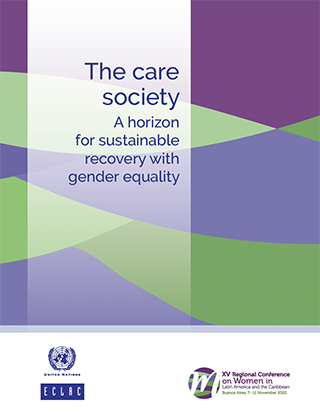 The care society: A horizon for sustainable recovery with gender equality
by
Call Number: LC/CRM.15/3Publication Date: 2022-11
The care society: A horizon for sustainable recovery with gender equality
by
Call Number: LC/CRM.15/3Publication Date: 2022-11 -
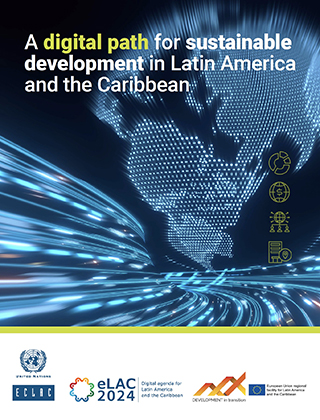 A digital path for sustainable development in Latin America and the Caribbean
by
Call Number: LC/CMSI.8/3Publication Date: 2022-11
A digital path for sustainable development in Latin America and the Caribbean
by
Call Number: LC/CMSI.8/3Publication Date: 2022-11 -
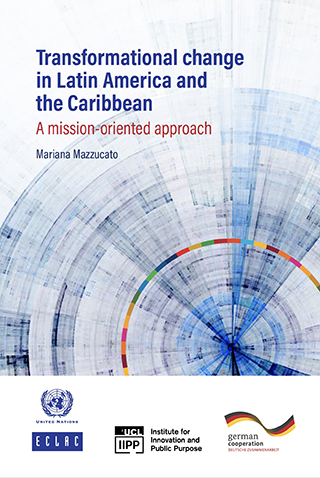 Transformational change in Latin America and the Caribbean: A mission-oriented approach
by
Call Number: LC/TS.2022/150/Rev.1Publication Date: 2022
Transformational change in Latin America and the Caribbean: A mission-oriented approach
by
Call Number: LC/TS.2022/150/Rev.1Publication Date: 2022

